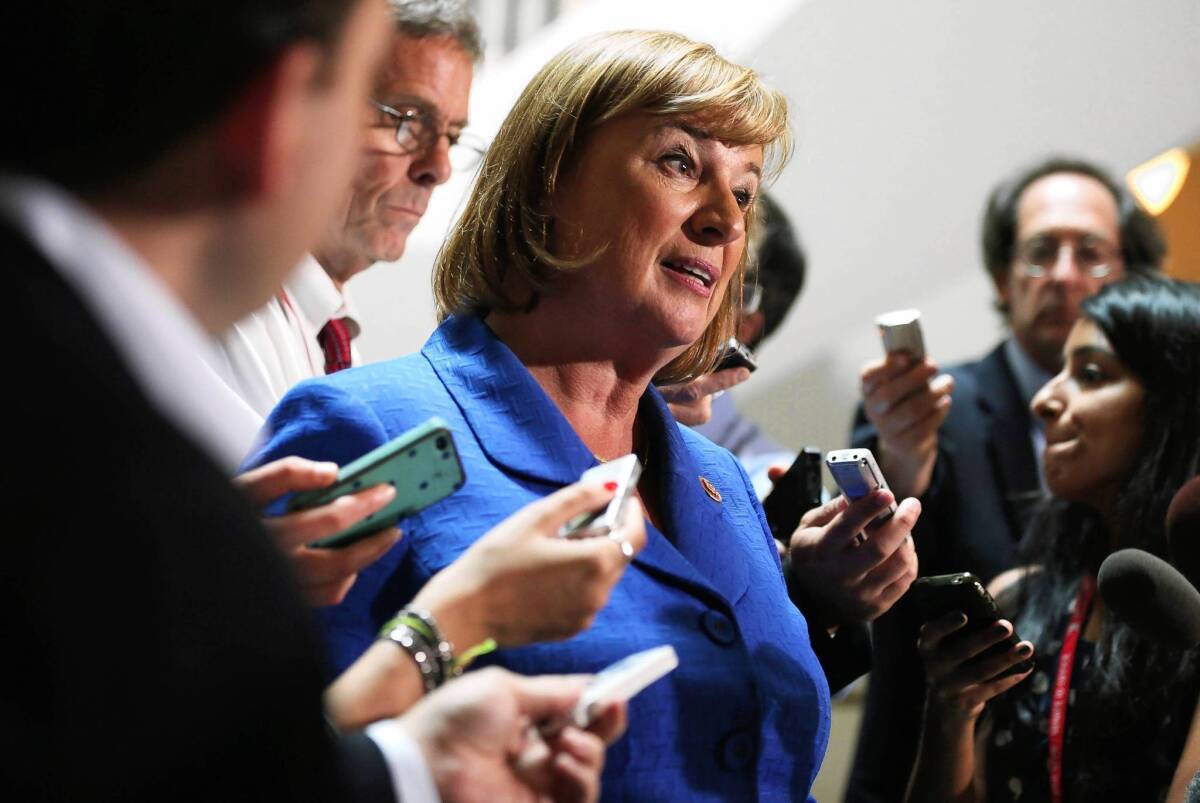Some lawmakers still unswayed by case for Syria strike

- Share via
WASHINGTON — A fierce lobbying effort by the White House and the support of congressional leaders for a resolution authorizing the use of force against Syria has done little to sway some lawmakers more concerned about the overwhelming opposition of their constituents.
The White House said officials, including President Obama, have had discussions with 185 lawmakers through Thursday, consultations that continued with another bipartisan, closed-door briefing at the Capitol.
But lawmakers who were inclined to vote against authorizing force to punish Syria for its alleged use of chemical weapons emerged from the briefing unswayed. Asked what she needed to hear to vote “yes,” Rep. Carol Shea-Porter said, “I haven’t heard it.”
“I think that there’s a long way to go for the president to make the case, and it does seem as if there’s a high degree of concern and leaning no,” the New Hampshire Democrat added.
With the first procedural vote on the joint resolution likely to come as early as Wednesday in the Senate, the White House announced that Obama would cancel a Monday trip to Los Angeles to speak at an AFL-CIO convention and attend a Democratic Party fundraiser so he could remain in Washington to work with lawmakers.
Obama, who arrived in St. Petersburg, Russia, on Thursday for an economic summit, continued to press his case with lawmakers for congressional authorization for a punitive strike against the Syrian government. A White House official said he called five senators Wednesday.
The administration continued to express confidence in a positive vote in the Senate, but the House, where liberal Democrats and anti-interventionist Republicans are skeptical, could prove troublesome.
“We’re very pleased with the trend lines,” said Deputy National Security Advisor Ben Rhodes, who briefed journalists in St. Petersburg. “I think each day what you’ve seen is different members coming out on a bipartisan basis to support an authorization to use military force.”
Rep. Xavier Becerra (D-Los Angeles), the chair of the House Democratic Caucus, was one of the few lawmakers who announced Thursday that he was moving toward a “yes” vote. “I’ve told the White House that I am prepared to be a yes if they keep it limited, but this is the difficulty they face,” he said in a television interview.
Sen. Mike Lee (R-Utah) said in a statement that in his view, “the risks of the president’s strategy far outweigh the possible gains.”
Sen. Joe Manchin III (D-W.Va.), who also attended Thursday’s classified briefing, said in a statement afterward that he felt that a military strike “is the wrong course of action,” an assessment influenced by “the concerns from thousands of West Virginians.”
In a statement announcing his decision to vote against the resolution, Rep. Gus M. Bilirakis (R-Fla.) said he shared the concern of many of his constituents about “engaging in this civil war.”
A supporter of the resolution, Sen. Dianne Feinstein (D-Calif.), acknowledged that constituent sentiment was “overwhelmingly negative.”
“They haven’t heard what I heard. And I like to believe now, after 20 years, that I have some skill in separating the wheat from the chaff,” she said.
Increasingly the president’s allies and other supporters of a military strike are asking Obama to step up his sales job to the American public. Secretary of State John F. Kerry said Wednesday that he had no doubt the president would address the nation from the Oval Office. But Rhodes said there were no plans yet to do that.
Rep. Sheila Jackson Lee (D-Texas), who is still considering how she will vote, said that such a national address would be helpful.
“I think, more than anyone else, the commander in chief of a nation would be an excellent person to articulate both his mission, his passion and what is the impact and danger of chemical weapons,” she said.
Ranking administration officials will also join in the effort. United Nations Ambassador Samantha Power is scheduled to discuss the “need for an international response” in Syria during a session Friday at the Center for American Progress, a think tank based in Washington.
But Rep. Alan Grayson (D-Fla.), a firm opponent of the resolution, compared the administration’s approach to the vote with the George W. Bush administration’s public lobbying in 2002.
“We only heard one side of the story then, and at this point, we’re only hearing one side of the story now,” Grayson said. “The administration is trying to — what’s the term that they use? Flood the zone? — and give us a monopoly of information in favor of an attack.”
Jackson Lee said she suspected most of her colleagues would consider their decision “up until the time of the vote.”
“Members are not hedging their bets,” she said. “We will stay in constant briefing as long as it takes.”
Times staff writer Kathleen Hennessey in St. Petersburg, Russia, contributed to this report.
More to Read
Sign up for Essential California
The most important California stories and recommendations in your inbox every morning.
You may occasionally receive promotional content from the Los Angeles Times.










